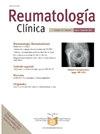¿Interacciona la microbiota humana con el tratamiento inmunosupresor de las enfermedades reumatológicas autoinmunes sistémicas? Revisión sistemática
IF 1.3
Q4 RHEUMATOLOGY
引用次数: 0
Abstract
Objective
To collect and analyse studies evaluating the interaction between the human microbiota (HM) and immunosuppressive (IS) treatments for systemic autoimmune rheumatological diseases (ARDs), and their impact on the disease.
Methods
A systematic review was performed based on an electronic search strategy in Medline, Embase, and Cochrane Library (inception-02/2024). We included papers studying the interaction of HM and IS treatments in adult patients with ARDs in which parameters of diversity and taxonomic composition were measured. We excluded spondyloarthritis for which more extensive knowledge is available. Studies of any language were allowed, prioritising clinical trials but also including observational longitudinal prospective and retrospective, and case-control studies.
Results
Of 2570 papers identified, 20 were included (15 from rheumatoid arthritis, 3 from systemic lupus erythematosus, 1 from primary Sjögren's syndrome and 1 from systemic sclerosis), overall, with a moderate risk of bias. The paucity of studies and niche specificity limited the study to the gut microbiota. A trend towards decreased diversity and compositional changes in gut microbiota and partial restitution in patients responding to IS treatment was identified. The heterogeneity observed in the design and outcome measures of the studies precluded a metaanalysis; however, the results point to a possible relationship between HM alterations and response to IS treatments in ARDs.
Conclusions
Available studies suggest a potential association between the HM and the response to IS therapies in ARDs. However, the overall moderate quality of evidence and substantial methodological heterogeneity limit the strength of combined conclusions. Standardization of microbiota-related studies is needed to enable data integration and support more robust inferences.
人类微生物群是否与免疫抑制治疗系统性自身免疫性风湿病相互作用?系统综述
目的收集和分析评估人体微生物群(HM)与免疫抑制(IS)治疗在系统性自身免疫性风湿病(ARDs)中的相互作用及其对疾病影响的研究。方法基于Medline、Embase和Cochrane Library (inception-02/2024)的电子检索策略进行系统评价。我们纳入了研究成人ARDs患者HM和IS治疗相互作用的论文,其中测量了多样性和分类组成参数。我们排除了脊椎关节炎,因为我们对它有更广泛的了解。允许任何语言的研究,优先考虑临床试验,但也包括观察性纵向前瞻性和回顾性研究,以及病例对照研究。结果在2570篇文献中,纳入了20篇(类风湿关节炎15篇,系统性红斑狼疮3篇,原发性Sjögren综合征1篇,系统性硬化症1篇),总体偏倚风险中等。研究的缺乏和生态位的特异性限制了对肠道微生物群的研究。确定了对IS治疗有反应的患者肠道微生物群多样性减少和组成变化以及部分恢复的趋势。在研究的设计和结果测量中观察到的异质性排除了荟萃分析;然而,研究结果指出,在ARDs患者中,HM改变和对IS治疗的反应之间可能存在关系。结论现有的研究表明,在ARDs患者中,HM和对IS治疗的反应之间存在潜在的关联。然而,证据的总体质量适中和方法的异质性限制了综合结论的强度。需要对微生物群相关研究进行标准化,以实现数据整合并支持更可靠的推断。
本文章由计算机程序翻译,如有差异,请以英文原文为准。
求助全文
约1分钟内获得全文
求助全文
来源期刊

Reumatologia Clinica
RHEUMATOLOGY-
CiteScore
2.40
自引率
6.70%
发文量
105
审稿时长
54 days
期刊介绍:
Una gran revista para cubrir eficazmente las necesidades de conocimientos en una patología de etiología, expresividad clínica y tratamiento tan amplios. Además es La Publicación Oficial de la Sociedad Española de Reumatología y del Colegio Mexicano de Reumatología y está incluida en los más prestigiosos índices de referencia en medicina.
 求助内容:
求助内容: 应助结果提醒方式:
应助结果提醒方式:


